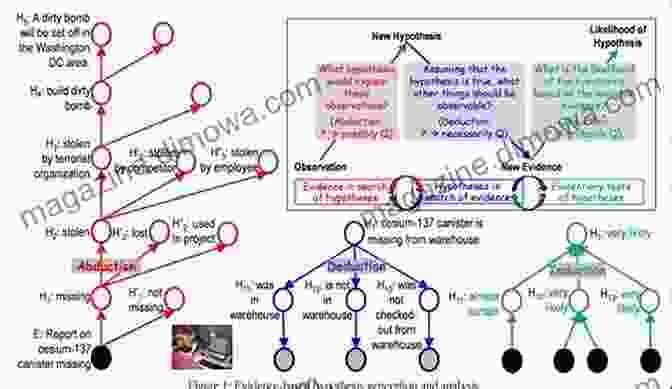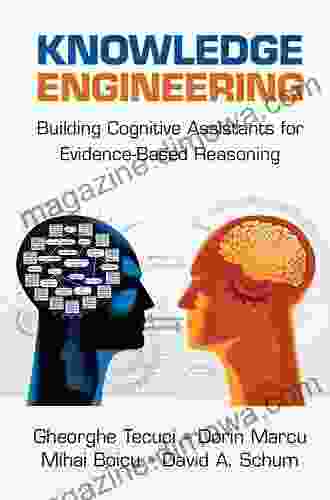Building Cognitive Assistants for Evidence-Based Reasoning

In the rapidly evolving field of artificial intelligence (AI),cognitive assistants have emerged as indispensable tools for solving complex problems and making data-driven decisions. These AI-powered systems are designed to mimic human reasoning, enabling them to process vast amounts of information, identify patterns, and draw logical s.
4.4 out of 5
| Language | : | English |
| File size | : | 49247 KB |
| Screen Reader | : | Supported |
| Print length | : | 480 pages |
One of the key challenges in building cognitive assistants is equipping them with the ability to reason with evidence. This requires the assistants to not only understand the content of text and data but also to evaluate its credibility, relevance, and logical implications. By incorporating evidence-based reasoning into cognitive assistants, we can empower AI systems to make more accurate and informed decisions.
A Comprehensive Guide to Building Cognitive Assistants for Evidence-Based Reasoning
This comprehensive guide provides a step-by-step approach to building cognitive assistants that can reason with evidence effectively. It covers all aspects of the development process, from data collection and preprocessing to model training and evaluation.
Data Collection and Preprocessing
High-quality data is essential for training cognitive assistants that can reason with evidence. This data should include a diverse set of text documents, such as news articles, scientific papers, and social media posts, that represent a wide range of topics and perspectives.
Once the data has been collected, it must be preprocessed to ensure that the cognitive assistant can understand and process it effectively. This may involve tokenizing the text, removing stop words, and stemming the words to their root forms.
Model Training
The next step is to train the cognitive assistant using a machine learning algorithm. The choice of algorithm will depend on the specific requirements of the application.
Some of the most common machine learning algorithms for evidence-based reasoning include:
- Supervised learning algorithms, which are trained on a dataset of labeled data
- Unsupervised learning algorithms, which are trained on a dataset of unlabeled data
- Reinforcement learning algorithms, which are trained through interactions with the environment
Evaluation
Once the cognitive assistant has been trained, it is important to evaluate its performance. This can be done using a held-out test set of data that was not used in the training process.
The evaluation process should assess the cognitive assistant's ability to:
- Identify relevant evidence
- Evaluate the credibility of evidence
- Make logical s
- Solve complex problems
Case Studies
To illustrate the practical applications of cognitive assistants for evidence-based reasoning, this guide includes a number of case studies.
These case studies demonstrate how cognitive assistants can be used to:
- Identify fake news and misinformation
- Provide personalized medical advice
- Recommend financial investments
- Solve complex scientific problems
Benefits of Building Cognitive Assistants for Evidence-Based Reasoning
There are many benefits to building cognitive assistants for evidence-based reasoning. These benefits include:
- Improved decision-making
- Reduced bias
- Increased transparency
- Enhanced creativity
- Accelerated problem-solving
Cognitive assistants for evidence-based reasoning are a powerful tool for solving complex problems and making data-driven decisions. By incorporating evidence-based reasoning into cognitive assistants, we can empower AI systems to make more accurate and informed decisions.
This comprehensive guide provides the knowledge and skills you need to build cognitive assistants for evidence-based reasoning. With its detailed instructions, real-world examples, and comprehensive coverage of the latest advancements in AI, this guide is an essential resource for anyone looking to develop AI systems that can reason with evidence.
Free Download your copy today and start building cognitive assistants for evidence-based reasoning!

4.4 out of 5
| Language | : | English |
| File size | : | 49247 KB |
| Screen Reader | : | Supported |
| Print length | : | 480 pages |
Do you want to contribute by writing guest posts on this blog?
Please contact us and send us a resume of previous articles that you have written.
 Book
Book Novel
Novel Page
Page Chapter
Chapter Text
Text Story
Story Genre
Genre Reader
Reader Library
Library Paperback
Paperback E-book
E-book Magazine
Magazine Newspaper
Newspaper Paragraph
Paragraph Sentence
Sentence Bookmark
Bookmark Shelf
Shelf Glossary
Glossary Bibliography
Bibliography Foreword
Foreword Preface
Preface Synopsis
Synopsis Annotation
Annotation Footnote
Footnote Manuscript
Manuscript Scroll
Scroll Codex
Codex Tome
Tome Bestseller
Bestseller Classics
Classics Library card
Library card Narrative
Narrative Biography
Biography Autobiography
Autobiography Memoir
Memoir Reference
Reference Encyclopedia
Encyclopedia Johannes M Henn
Johannes M Henn Life Lab Academy
Life Lab Academy Pasha Malla
Pasha Malla Joan Mullally
Joan Mullally Michael E Gerber
Michael E Gerber John Lazenby
John Lazenby John Howells
John Howells John Jowdy
John Jowdy Karen Telling
Karen Telling Jocelyne Lamoureux
Jocelyne Lamoureux Samit Roy
Samit Roy Nicole Hennig
Nicole Hennig Kate Jarvik Birch
Kate Jarvik Birch Karen Latchana Kenney
Karen Latchana Kenney R T Fitch
R T Fitch Joe Cuhaj
Joe Cuhaj John L Koprowski
John L Koprowski Michelle Major
Michelle Major Peter Chapman
Peter Chapman Kate M Williams
Kate M Williams
Light bulbAdvertise smarter! Our strategic ad space ensures maximum exposure. Reserve your spot today!

 Dwight BellWhen the Bullies Don Win: The Unforgettable Story of Courage, Resilience, and...
Dwight BellWhen the Bullies Don Win: The Unforgettable Story of Courage, Resilience, and... Albert CamusFollow ·19k
Albert CamusFollow ·19k Gustavo CoxFollow ·12k
Gustavo CoxFollow ·12k Johnny TurnerFollow ·15.3k
Johnny TurnerFollow ·15.3k Harold BlairFollow ·18k
Harold BlairFollow ·18k Wesley ReedFollow ·3.3k
Wesley ReedFollow ·3.3k William ShakespeareFollow ·6.4k
William ShakespeareFollow ·6.4k Winston HayesFollow ·4.6k
Winston HayesFollow ·4.6k Oliver FosterFollow ·4.3k
Oliver FosterFollow ·4.3k

 Joshua Reed
Joshua ReedTake Your Marketing Business Into The Next Level
Are you ready to...

 Aaron Brooks
Aaron BrooksFrom Fourier to Cauchy-Riemann: Geometry Cornerstones
From Fourier to Cauchy-Riemann: Geometry...

 Orson Scott Card
Orson Scott CardUnveiling the Art of Mitigation Banking: A Comprehensive...
In the intricate dance between...

 Victor Hugo
Victor HugoUnleash Your Creativity: A Journey Through the Enchanting...
Prepare to be captivated as we...

 Duncan Cox
Duncan CoxLoad of Bull: An Englishman's Adventures in Madrid
By Simon Bunce ...
4.4 out of 5
| Language | : | English |
| File size | : | 49247 KB |
| Screen Reader | : | Supported |
| Print length | : | 480 pages |












